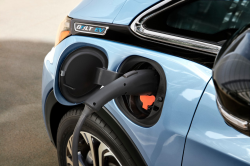
— The Chevy Bolt range in winter is the focus of a proposed class action lawsuit that alleges the electric cars don't get anywhere near the advertised travel range when driving in cold weather.
Plaintiff Jason Haas says he purchased a Chevrolet Bolt in November 2017 believing the range to be about 238 miles on a single charge. But the plaintiff claims winter driving causes the range to drop by 100 miles and the automaker never made him aware of it.
The plaintiff says Bolt drivers in Minnesota, Montana, North Dakota, Iowa and South Dakota should be included in the lawsuit due to the cold winter months.
Attorneys for General Motors tore into the plaintiff's claims, starting with the lawsuit being filed against "GMC," which doesn't sell the Bolt. But then attorneys for the automaker point out lawsuit documents say the plaintiff purchased a "2007 Chevy Volt."
"It is therefore somewhat unclear whether Plaintiff intends to allege he purchased a Chevrolet Volt, which is a plug-in electric hybrid, or a Chevrolet Bolt, which is fully electric with no combustion engine. Based on the allegations, GM assumes for purposes of this motion only that Plaintiff purchased a Bolt." - GM's attorneys
GM also argues the plaintiff claims he read literature about the car and saw its advertised range as 238 miles. GM says if the plaintiff did indeed read about the Bolt, he would have seen where it says, “actual range may vary based on several factors including temperature, terrain, and driving conditions.”
The automaker says that same language appears as a disclaimer on the Chevy Bolt website when someone clicks any reference to vehicle electric charge or vehicle range.
General Motors also argues the 2017 Bolt owner's manual continuously references that cold weather may adversely affect the vehicle’s battery and range. In addition, the manual further explains the vehicle itself continuously recalculates its forecasted range "based on current driving conditions and use of climate control systems."
The automaker says it is very upfront with potential buyers about how driving range can decrease when using the heat because anything that creates heat is doing it by using electric from the battery.
According to GM, the plaintiff’s claim for fraudulent misrepresentation is bogus because it says, “Defendants intentionally or recklessly represented to the Plaintiff that the Bolt is as functional in the winter as it is in the summer.”
However, attorneys for GM told the judge the plaintiff failed to "identify any document or conversation in which Defendants actually made such a statement."
The Chevy Bolt winter driving range lawsuit was filed in the U.S. District Court for the District of South Dakota - Haas, et al., v. General Motors, LLC, et al.
The issue of driving range in various weather conditions has been studied by researchers who determined cold temps can decrease the travel range by 41 percent.
CarComplaints.com has owner-reported complaints about Chevrolet Bolt cars.




